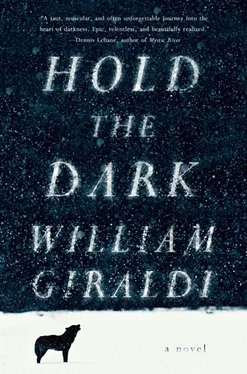They packed him and the husky against the stanchions with more pelts, his head on the brush bow, his face in the animal’s neck, his body slowly imbued by the eighty-pound heat of the dog. Under him he felt the rough skidding of the runners on crusted snow, and then the smooth riding in fresh fall as the sleds mushed on toward moonlight.
Each time he dipped into a shallow sleep he expected the abyss, expected not to wake, not to rise. When he did, he once again felt the sled’s motion, smelled the dog, heard the canine yelps just ahead of him. Each time he woke he had to learn anew that he was not dead. A jagged passage—one hour or two, he could not be sure, time had turned into a back-and-forth slosh of sand, his memory leaping over decades. The sleds arrived in the village of Keelut.
The men carried him into a cabin and left, left him in front of the fire with a huddle of short-sleeved women who unwrapped the blanket from his body and stripped him to the waist. The arrow wound had ceased bleeding, had dried front and back in dark caps. A woman brought a basin of warm water and rags. They stripped him full and washed him there on the floor before the fire, on a blue tarpaulin, lifted his head so he could drink from a squeeze bottle, and when the wounds were clean they daubed them with a pungent ointment that chilled before it stung. He saw a blond woman take up the caribou suit. She looked it over, sniffed it for scent, and Core could not comprehend what was happening.
With car-wash sponges they rinsed his lap and legs where blood clung in clotted naps. He lay aware of the water and air on his shrunken genitals, but he was unashamed. They dried him gently and then dressed him in clothing soft and old with mothball scent. The tenderness of the female hands on his chest and limbs took him close to weeping.
When had such loving hands touched him last? He was just then willing to die, again and again, to experience such affection, such saving as this. Before apathy had claimed him how often had he gone to the barber for just that reason? Not because his hair needed trimming but because those hands on his head were a confirmation that he was still here, still capable of knowing touch. No body massage ever felt as fine as a barber’s delicate fingers.
They gave him more water from the bottle and then brought a cast-iron pot warmed in the fire, an acrid broth gamy and sweet. The blond woman fed him with a birch ladle, a woman near his age, it seemed—the mother of either Medora or Vernon Slone, he was sure.
He drank the broth while others held him upright. He could not shift his eyes from this woman who fed him because he saw that her face, by some witch’s trick, was a mix of both Medora and Vernon Slone—the fine blond hair, the nose and chin, the yellow-brown eyes and oval ears. In this woman’s still-lovely face he could behold both of the Slones. She was the mother of both. He recalled the matching faces of her daughter and son as they’d knelt beside him in the steam of the cave.
And before he let sleep drag him down into a wide pasture of night, he understood that this one woman above him, this woman caring enough to save him, was not just the source of both faces, but also, perhaps, the reason for the wolves.
* * *
When he woke the following morning in a hospital in town his daughter was there, sitting beside him in a wooden chair, wearing glasses he’d never noticed, a red sweater as if to welcome the holiday. Her smile signaled only the smallest relief. In the medicated fog of waking he believed for a minute that she was his wife thirty years ago. He glanced to the blanket then and felt his hand in her own.
She’d want to know all he’d witnessed. She’d want to hear the truth of these events. But he would have for her only a story—one that seemed to have happened half in dream, rent from the regular world he knew—and that story would wear the clothes of truth. Propped up in bed, he prepared himself for this tale. He searched for the beginning, and for the will to believe it.
They spent the remaining months of winter many miles from Keelut, in their father’s sod igloo hidden in the taiga, an earthen grot he’d built when they were children for three-week hunting trips. They’d known about these crude outposts all their lives—many hunters in the village had built them for the winter hunt when the caribou migrated east. In the valley beyond the village their mother had left them backpacks of provisions, including a map with the location of their father’s sod igloo circled in blue pen.
It had taken them an entire day to find it, in four-wheel drive on pathways until the truck was choked by snow, until they were forced to walk, carrying what they could. They dug for forty minutes through drifts to reach the entrance, the pine door that looked clawed at by grizzly. Once inside they found it dry, with a working stove, cut wood and kindling stacked beside it, steel drums packed with nonperishables made before their birth. That clean scent of frigid earth until Slone cleared the vent of snow and started the stove.
They saw at once that their father had stocked this lee with food for two seasons: Bisquick and beans, oatmeal and rice, noodles and raisins, powdered milk and coffee, dried peaches and apricots. In a different drum: medical kits, candles and matches, radio and batteries, tissue paper and snowshoe bindings, Coleman fuel and lantern wicks. The chocolate she’d devoured as a child and hadn’t seen in years. Cartons of cigarettes. Sweaters, socks, long johns, overalls. Blankets, ammunition, books. A mattress hung by wire from the low ceiling to keep rodents away. With sugar and vanilla they could make ice cream of snow.
Perhaps, she thought, their father had prepared for this very day, the day when his twins would need this shelter—the day their otherness became known and they were forced to flee, to enact their exile from the world for sins they could not control. She hadn’t seen their father’s face in six years, since the evening before he slipped a shotgun barrel into his mouth and pressed the trigger with his toe, but she remembered it, could recall his cigarette scent, his voice always as rough, as stubbled as his appearance. This sod igloo meant that he’d loved her, she knew—meant that he’d loved them both, no matter their otherness.
They slept and ate and read, feasted on one another in the afternoon. She rebandaged the bullet wound in his upper back, applied ointment, pulled the stitching once it fully healed. For weeks they did little but lie naked beneath blankets as snow piled around them, exhausted in a way she’d never felt before, the stove too much heat for this small lee. He chopped more wood and hunted lynx, fox, rabbit, whatever he could find, but a famine was still on this land and he couldn’t find much. He kept the rifles ready by the entrance, shotgun by the stove, handgun always in his belt. He told her what to do if ever he was out and she heard men coming through the thick. In six places around the perimeter he strung tripwire between trees, in front of the wire sharpened sticks in the snow to impale a man.
One afternoon, hunting before dusk, they came upon a single-engine propeller plane suspended, mangled in the treetops, camouflaged in snow—one of the countless lost planes in this country. Lighter than her brother, always the better climber, she let him hoist her into the branches and she made her careful way to the plane above. Through the shattered glass she saw the bush pilot seat-belted in a bank of snow, just a wool-clad skeleton now, the headset still fastened to its skull. The propeller was smashed back into the engine from the impact, on the door black streaks from fire. The tail cracked and dangling, one wing snapped off, bent beneath the fuselage. She brushed snow from the other wing, tested her weight on it, and entered through the missing glass. Behind the seats several wood-slat crates of mail. The year stamped on the letters was 1968. She dropped a bag down to Slone—there was nothing in the plane they needed—and for two weeks that winter she read these letters, forgotten messages from worlds she tried to imagine, amazed by the varied handwriting of people who had long since moved on to other lives.
Читать дальше












